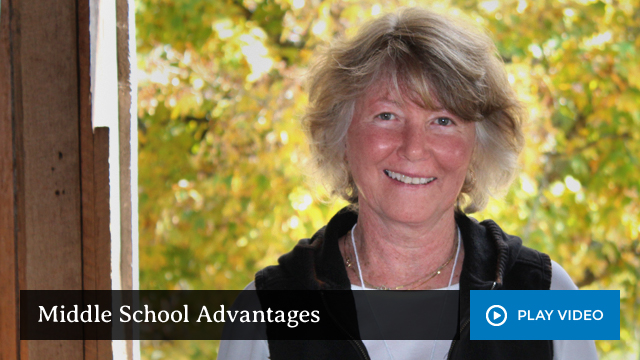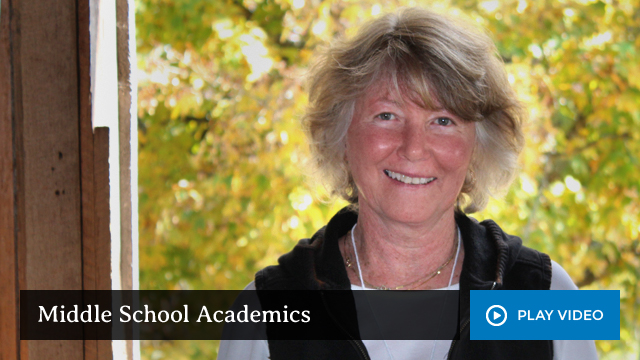The Middle School Program offers rigorous academic studies and purposeful work that emphasizes the interconnectedness among all academic subjects preparing the adolescent for their high school years. Through both traditional schoolwork and experiential work students develop lasting knowledge, confidence and competence, as well as a sense of responsibility and of belonging.

The Need for Social Development
Adolescence is a very social stage of development, a time of camaraderie, friendship and teammates. Relationships are the first priority of any middle schooler. FVAM encourages and fosters peer relationships through collaborative learning and community responsibility. In the classroom, students can work together to help each other process, understand, expand and develop dynamic ideas. FVAM's approach focuses on “we”, not “me”.
Emotional Development
Middle school-aged students confront human nature honestly and directly. They are aware of the powerful complexities and dilemmas of life. Questioning and confronting every issue is characteristic. This emotional engagement presents the possibility for remarkable growth, understanding, compassion and empathy.
At FVAM, we encourage students to engage in discussions and debates that lay the foundation for a deeper understanding of a topic. We support and encourage the expression of a wide range of perspectives. It is through these opportunities that students develop the confidence to express their views, be heard and receive responses. Understanding and celebrating different viewpoints brings a deeper appreciation for others and a broader, more compassionate view of the world.
Humanistic Development
Adolescents engage in regular struggles with the question of morality...right and wrong. A Montessori environment offers the opportunity for discussion and guidance to encourage the development of a strong personal value system.
At FVAM, moral standards are set at a high level. Mistakes are viewed as an opportunity for further growth and understanding.
For our adolescent students, these valuable lessons are the foundation for the human spirit. Just as our younger students learn grace and courtesy lessons, the older child learns beneficial life skills about how to function in the demanding and complex world of higher education and beyond.
Through a respectful classroom environment with humanistic values, job sharing, community outreach projects, and annual class trips, such as the Montessori Model United Nations in New York City, we teach our emerging adults the importance of both local and global responsibility.
Self-Oriented Development
A properly prepared adolescent environment provides an inviting context for social relationships and is a staging area for building a community structure. Relationships connect adolescents to adults and each other, which fosters the occurrence of a higher level of socialization. Through community action, adolescents experience a view of the collective role of humanity and the “cosmic task” of the individual. They learn to live and work with others, and to contribute. They experience interdependency and cooperation. They learn the reason for rules and laws and how to adapt to societal needs and assume a constructive role in society. This process promotes the development of social consciousness.
Development of Moral Education
Adolescents benefit from a dynamic training of character, which leads to the development of a social conscience, a sense of justice and personal dignity.
The outcome of strong character development includes a respect for self and others, which is based on the measure of social contribution. It encompasses the willingness to assume responsibility, and grapple with social and ethical issues. Moral education highlights the genesis of community values, and fosters an understanding of the importance of initiative and commitment. Students often recognize the relationship between their individual growth and the progress of the human community. At FVAM, students learn and work in collaboration with teachers and each other. They each share in the work and responsibility of maintaining the many aspects of school life, such as, the classroom, the garden, the care of animals, and the care of the environment.

Character Development
Adolescents thrive when they have opportunities that truly engage their strengths. Students often pursue personal interests with commitment and fervor. Curiosity that arises from within leads to intense research and knowledge building. A love of learning is a characteristic of a Montessori education. FVAM offers a broad range of experiences leading students to develop areas of high interest and in turn personal achievement.
Finding One’s Place in the World
Each student at FVAM is a unique individual, who is in the process of self- discovery. Young men and women encounter many experiences from which they create a personal vision. This vision guides decisions and charts future choices. A personal plan inspires a student to think long term and consider consequences. A middle school student with a goal is a student with a meaningful vision of the future. FVAM provides an environment where curiosity is fostered through interactive learning, where students are encouraged to make independent choices, develop self awareness and become intrinsically motivated. Guidance and support nurtures each individual's achievement.
Cognitive Development
Middle school students are most motivated to learn when their work is useful or purposeful. Direct, active learning is not only engaging, but allows the adolescent to self-reflect. Dr. Montessori?s syllabus is not a subject list. It includes “opportunities for self-expression”, such as linguistic and artistic studies, fulfilled through music, art and theater. A second aspect of the curriculum, called “the formative studies”, constructs firm foundations for building character. At FVAM, the adolescent's thoughts and ideas are respected allowing them to interact in a more complex, abstract way within the environment. These subjects encompass science and mathematics. A third dimension is “general education”, which is the preparation for adulthood. It pertains to the study of the many aspects of history.
Independent Thinker
FVAM emphasizes the student's “natural desire” to learn. Middle school students are empowered and participate in their own learning process. Teachers are facilitators, guiding students to use meaningful higher-level thinking. Students are exposed to strategies and activities that establish lifelong skills in creative and critical thinking, writing, language, technology, Spanish, Latin, algebra, preparation of presentations, as well as personal and social responsibility. FVAM fosters independent thinkers who are diligent, inventive, thoughtful, collaborative and innovative problem solvers in our constantly changing world.











